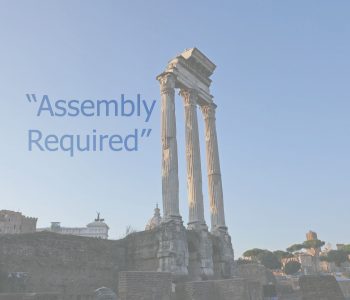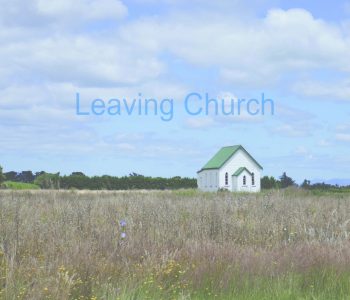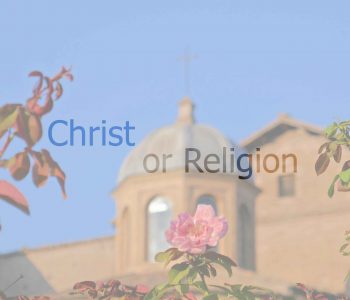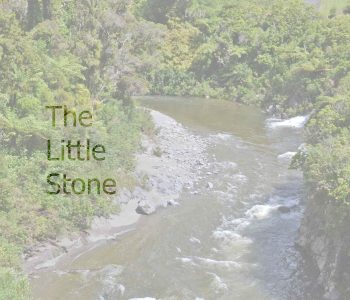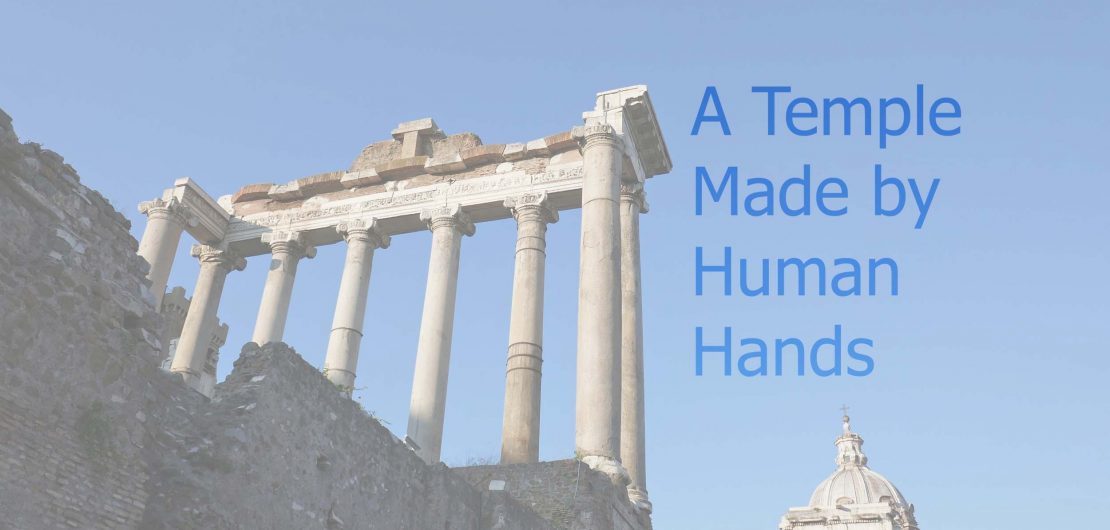 Life...
Life...
A Temple Made by Human Hands
It is one of our natural, human desires to want to do something for those we love, and this obviously includes doing things for God; we desire to please Him with whatever we can do for Him. This was clearly demonstrated by Peter when he saw Jesus revealed (Matthew 17). Peter’s natural response upon seeing Jesus, Moses and Elijah was the desire to do something: to construct and build something for all three men. He said: “Lord, it is good for us to be here; let us make three shelters (or tabernacles) one for You, one for Moses, and one for Elijah”. This was his natural, human reaction without even needing to think about it!
So many of us today do exactly the same thing as Peter with those we perceive to be spiritual men and women – and without thinking about it. We delight in them, they are awe-inspiring, they are our heroes. We love to listen to them and while we may not physically build a tabernacle or temple for them, in our hearts we may effectively do so without realising it, and end up worshiping them instead of the Son of God. Moses and Elijah were great men of God, but God’s response to this suggestion of building something was, and still is: “THIS is My dearly loved Son, who brings Me great joy; listen to HIM!”
When God breaks our mindsets and opens our eyes to see and hear His Son, our response is the same as that of the disciples: “When the disciples heard the voice, they were so afraid that they fell flat on the ground. But Jesus came over and touched them. He said, “Get up and don’t be afraid!” When they opened their eyes, they saw only Jesus.” Through what they saw, and in hearing God’s admonition to listen to Him, and even in spite of their fear, the end result was that “they saw only Jesus”. When we experience seeing and knowing Jesus Christ in an earth-shattering, revealing way, no longer will we idolise the earthly, because we will have eyes for One only. No longer will we see building churches and temples as being something good for God and “good for us” but quite the opposite, for we will see God’s intention and that He has only One in view: “I saw no temple in the city, for the Lord God Omnipotent and the Lamb Himself are its temple” (Rev. 21:22).
This Temple (Christ) is not a physical building that we can see or go to, nor can He be constructed by us – it is ludicrous and presumptuous to think that we could do so! But that in itself can present a challenge and an offence to us.
“God who made the world and all that is in it, being Lord of both Heaven and earth, does not live in temples made by human hands, nor is He ministered to by human hands, as though He had need of anything – seeing that He is the One who gives to all men life and breath and everything else.” Acts 17:24,25.
The Temple – Made with Hands
Oh, how we do love to do things and make things which we (and of course others) can see, hear and touch on this earth! As Stephen said in his speech:
“Our ancestors carried the Tabernacle with them through the wilderness. It was constructed according to the plan God had shown to Moses. Years later, when Joshua led our ancestors in battle against the nations that God drove out of this land, the Tabernacle was taken with them into their new territory. And it stayed there until the time of King David. David found favor with God and asked for the privilege of building a permanent Temple for the God of Jacob. But it was Solomon who actually built it. However, the Most High doesn’t live in temples made by human hands. As the prophet says, ‘Heaven is My throne, and the earth is My footstool. Could you build Me a temple as good as that?’ asks the Lord. ‘Could you build Me such a resting place? Didn’t My hands make both heaven and earth?’ You stubborn people! You are heathen at heart and deaf to the truth. Must you forever resist the Holy Spirit? That’s what your ancestors did, and so do you!” (Acts 7:44-51).
What was Stephen referring to that was ‘heathen’ and resisting the Holy Spirit? In the context of what he’d just been speaking about it seems to speak of one thing that all religions had in his day and still have today: temples. Or, in modern Christian terms: churches. The temple was a very sacred thing to the Jews (just as the church is to many Christians) and the significance of what Stephen said was not lost on them. They were very angry with him for saying that God didn’t need or want their sacred buildings and promptly killed him; thinking they were doing God a favour. And that is what is still often done today because the truth that God doesn’t need or want these structures that we build, hits right at the very heart of idolatry.
But wasn’t the temple God’s idea in the first place? No, it was the tabernacle that God asked Moses to make, and the tabernacle was a tent and not a building.
The tabernacle was in use right up until the time of King David and then it disappeared… David thought he had a better idea: a permanent building, a temple like other religions had. If you read the passage above again, you will see that it was David who asked to build the temple, and not God who asked for it. This fact is made even clearer in the Old Testament accounts, one given in 2 Samuel 7, the other in 1 Chronicles 17 (from the NKJV):
“Now it came to pass, when David was dwelling in his house, that David said to Nathan the prophet, ‘See now, I dwell in a house of cedar, but the ark of the covenant of the Lord is under tent curtains.’”
I had never realised until reading that verse, that building the temple was David’s idea. God didn’t ask David to build the temple, nor did He want him to (which He clearly tells David shortly thereafter). Apparently it didn’t seem fair to David – from his earthly, human perspective – that he lived in a beautiful palace while the ark of the Lord was in a tent. That, of course, sounds very noble and good to us humans, and when he told the prophet Nathan about his idea, Nathan’s response to David was:
“Then Nathan said to David, ‘Do all that is in your heart, for God is with you.’”
One question needs to be asked here: had God been consulted??? Had He said anything to either Nathan or David about a temple up to this point? Apparently Nathan thought the idea of building a temple sounded like a good idea too, so it appears that he presumptuously endorsed it on God’s behalf because the following verses make it clear that he hadn’t yet asked God what HE thought about the idea. Just because God is with us and has blessed us, doesn’t mean we can go and “do all that is in your heart” – not even for the man who was said to be a man after God’s own heart. And just because we see something that we think God needs us to do for Him, doesn’t mean He wants us to do it.
That very night God came to Nathan with a strong message:
“But it happened that night that the word of God came to Nathan, saying, “Go and tell My servant David, ‘Thus says the Lord: ‘You shall not build Me a house to dwell in.For I have not dwelt in a house since the time that I brought up Israel, even to this day, but have gone from tent to tent, and from one tabernacle to another.‘”
So God said the opposite of what Nathan had told David on His behalf! Instead of God telling David to “do all that is in your heart” He told him through Nathan that he was NOT to build a temple. The tabernacle or tent is significant here because it was a temporary dwelling, entirely adjustable, and would move on easily. Whenever the pillar of fire moved in the wilderness, the tents were packed up and the people moved with God leading them on. But you cannot move a temple building; it is firmly attached to the earth, it is earthly. A temple’s foundations are fixed on this earth and not in the heavens. God did not want to be stationary, He is a God Who moves. He went on to say,
“Wherever I have moved about with all Israel, have I ever spoken a word to any of the judges of Israel, whom I commanded to shepherd My people, saying, ‘Why have you not built Me a house of cedar?’ Now therefore, thus shall you say to My servant David, ‘Thus says the Lord of hosts: “I took you from the sheepfold, from following the sheep, to be ruler over My people Israel. And I have been with you wherever you have gone, and have cut off all your enemies from before you, and have made you a name like the name of the great men who are on the earth. MoreoverI will appoint a Place for My people Israel, and will plant them, that they may dwell in a place of their own and move no more; nor shall the sons of wickedness oppress them anymore, as previously, since the time that I commanded judges to be over My people Israel. Also I will subdue all your enemies.”
It sounds as though God was reminding David WHO was in charge and that He was quite capable of asking David or anyone else to build Him a temple if that had been what He had wanted. God was satisfied with the tabernacle, even though man might despise it for being so temporary and unimpressive. He continued,
“Furthermore I tell you that the LORD will build you a house.”
God’s House – Made Without Hands
David appeared to have had things around the wrong way; instead of him building a house for God, God wanted to build him a house! But was this promise to David fulfilled, did God build David a house? No, not on this earth, and not in David’s lifetime. We can now see that this promise was fulfilled in Christ and that God was speaking of Him: “Destroy this temple, Jesus answered, and in three days I will build it again! …But Jesus was talking about His body as the temple.” (John 2:19-21). God had something far, far greater than Solomon’s temple in mind: Christ, “Something greater and more majestic than the temple is here!” (Matt. 12:6).
God’s message for David continued along these same spiritual lines:
“And it shall be, when your days are fulfilled, when you must go to be with your fathers, that I will set up your Seed after you, who will be of your sons; and I will establish His kingdom. He shall build Me a house, and I will establish His throne forever. I will be His Father, and He shall be My Son; and I will not take My mercy away from Him, as I took it from him who was before you. And I will establish Him in My house and in My kingdom forever; and His throne shall be established forever.”
Was this literally fulfilled? No, even though David thought God’s words were about his son Solomon and it was partially fulfilled through Solomon. However, Solomon’s throne was not established forever on this earth. The temple that Solomon built lasted in all its glory for a mere 34 years before being ravaged and spoiled, beginning a cycle of restoring the temple only to have it ravaged again and again, until it was eventually destroyed. God in His grace did inhabit that structure for a short time, but when He inevitably moved on, the temple could not move with Him and it was left behind; an empty shell for man to maintain. They would continue to hold their meetings and perform their rituals in it, but they would not meet God there, they would meet only each other.
The temple had replaced the tabernacle, but Solomon’s temple was to be replaced with a new Temple, which Ezekiel saw very clearly. This House is God’s creation and God’s Way: Christ! “When God speaks of a “new” covenant, it means He has made the first one obsolete. It is now out of date and will soon disappear… By these regulations the Holy Spirit revealed that the entrance to the Most Holy Place was not freely open as long as the Tabernacle and the system it represented were still in use. This is an illustration pointing to the present time… For that old system deals only with… physical regulations that were in effect only until the time of reformation and setting things straight.” (Heb. 8:13, 9:8-10).
Jesus said “Destroy this temple, and in three days I will build it again,” meaning Himself. But this was extremely offensive to those whose lives revolved around the temple, just as it is offensive today to those whose lives revolve around the church, because so much of this temple mentality continues today as though God is inhabiting it and pleased with it.
The tabernacle (and the Sanctuary of the temple) were simply a picture of what was to come, they were symbolic of Christ in this world. The outer courts of the temple were a busy and noisy place where animals were tethered, slaughtered and sacrificed on the altar. But the Sanctuary consisted of the Holy Place and the Holy of Holies. The Holy Place had very little activity compared with the outer courts; it was where the lampstand, the table of showbread and the altar of incense (all symbolic of Christ) were kept. The Holy of Holies was only entered into once a year and the priest did very little in it – a big contrast to the daily, busy activity of the outer courts of the temple.
It is significant that Jesus did not say that the whole temple would be destroyed and rebuilt; only the Sanctuary itself. John used two different words for “temple” in John chapter 2. The first two instances of the word “temple” is hieron and means the whole of the temple including its outer courts. But the word which is used three times at the end of the chapter (including the one Jesus used in reference to Himself) is a different word – “naos” – which means ONLY the Sanctuary itself, consisting of the Holy Place and the Holy of Holies. Matthew and Mark bear this out as they used exactly the same words for what Jesus had said. All other writers in the New Testament also used this word “naos” in reference to the Body of Christ instead of “hieron” (Acts 7:48, 17:24; 1 Cor. 3:16,17, 6:19; 2 Cor. 6:16, Eph. 2:21, Rev. 3:12, 21:22 to name a few). It is significant that our English word “hierarchy” is derived from the root of the word “hieron” meaning temple.
The secular Greek definition of this word “naos” or sanctuary, was “inmost part of a temple, containing the image of the god” and interestingly, “a portable shrine” – reminiscent of the tabernacle or tent of the Lord. This word is also used of us as the ‘temples’ of the Holy Spirit in 1 Cor. 3:16. There are no instances of the word “hieron” (the temple) being used in reference to Christ or His Body in the New Testament at all. Instead the word meaning a sanctuary or holy place is used, but our English translations don’t differentiate between the two.
The fact is that there is only One who fully satisfies God, and we share in God’s pleasure and delight in His Son when we are in Him – when we are living stones being built into this House which is Christ. As I said, it is one of our natural, human desires to want to do something for those we love, and this obviously includes doing things for God; we desire to please Him with what we do and with whatever we can make for Him. But, in the words of T. Austin-Sparks, “It is not what is done for God, but what is done by God that will last.” And that is a very important distinction.
Kings and Kingdoms
I think it is beyond refute that it was never God’s intention for us to have buildings or temples on this earth in which to worship Him like the religions of this world who have temples for their gods. Most of us are aware of the fact that the Israelites having a king was not God’s idea either (1 Sam. 8:4-7). Their reason for wanting a king was so that they would “be like all the other nations” and have a king who would lead them and defend them (1 Sam. 8:19,20).
God warned the Israelites that the result of their demanding a king would be that they would be in bondage and subjection to their king and that he would use them and abuse them. He told Samuel to say to the people, “If you have a king, this is how he will treat you. He will force your sons to join his army. Some of them will ride in his chariots, some will serve in the cavalry, and others will run ahead of his own chariot. Some of them will be officers in charge of a thousand soldiers, and others will be in charge of fifty. Still others will have to farm the king’s land and harvest his crops, or make weapons and parts for his chariots. Your daughters will have to make perfume or do his cooking and baking. The king will take your best fields, as well as your vineyards, and olive orchards and give them to his own officials. He will also take a tenth of your grain and grapes and give it to his officers and officials (the tithe). The king will take your slaves and your best young men and your donkeys and make them do his work. He will also take a tenth of your sheep and goats. You will become the king’s slaves.”(1 Sam. 8:9-17). All of this is so clearly evident in churches today where there is loyalty to the system, to the building, to the meetings and to the pastors or religious leaders, instead of loyalty to God alone. God took this decision very personally; He saw that the people were rejecting Him as their King (1 Sam. 8:7). He wanted to be their only King just as He wants to be our only Meeting Place…
Our common ground is not meant to be whether we go to church or what denomination we are part of, or what doctrines we believe, or what teachers we listen to; our common ground, our communion (common union), our Place of Meeting is simply Christ! When He is both King and the Meeting Place in a person’s life, we find that we have instant communion and fellowship with them because Christ IS our Place of meeting! In this Holy Place we find ourselves in union with God and with His Family.
Today the majority of Christians are no different than the Israelites who wanted a temple and a king, just as Stephen said in his speech. We have built “temples” and we have wanted “kings” to look up to and to tell us what to do and what not to do, what to read and what not to read, what to believe and what not to believe, where to go and where not to go (the list is endless) instead of asking, and hearing, and knowing God for ourselves. The result of all these kings and temples are many religious kingdoms which are sustained by man and not God and which often abuse and exploit people. Jesus gave us the example of true leadership Himself by being a servant and running away when the people wanted to make Him their King (John 6:15). The Kingdom of God is NOT of this world: “My kingdom,” said Jesus, “doesn’t consist of what you see around you. If it did, My followers would fight so that I wouldn’t be handed over to the Jews. But I’m not that kind of king, not the world’s kind of king.” (John 18:36).
We each need to honestly answer the question: “WHO is king in my life?” A kingdom is a place where the king governs and decides everything. Even though we may not yield to another person as king, often we fail to realise that the one person who may be acting as king by reigning and ruling supreme in our lives, stares back at us every time we look in a mirror! In speaking of who is king in our lives, we are talking about what our heart loves above all else, for the heart is the throne where whomever we love and admire the most resides. When Christ is our King we find ourselves lovingly yielding to Him and seeing His Way, His Truth, and His Life established in our lives as we become like the One we love….
While I saw all this years ago as relating to kings in our lives, it was only recently that Father showed me how this also related to the temple when reading an article entitled “The Tragedy of the Temple“. I saw that building a temple/church reveals that inherent desire of ours to do something for God, and wanting a religious leader to tell us what to do and how to do it reveals our inherent desire to have a king here on earth to govern us. But both a king and a temple are focusing upon what is seen here on earth rather than spiritually perceiving what is unseen (2 Cor. 4:18). They are substitutes for the Real and the True and we often idolise them – allowing them to become the centre of our lives instead of Christ. Whatever we idolise very effectively blinds us from seeing Truth because our eyes are on our idol so we can see nothing past that. We need to be shaken out of our idolatry by hearing God’s words deep in our hearts: “THIS is My dearly loved Son, who brings Me great joy; listen to HIM!” May God continue to shatter our idols and open our eyes so that we will see and worship “only Jesus”.
“Christ came as High Priest of the good things to come, with the greater and more perfect tabernacle not made with hands, that is, not of this creation.” Heb. 9:11



